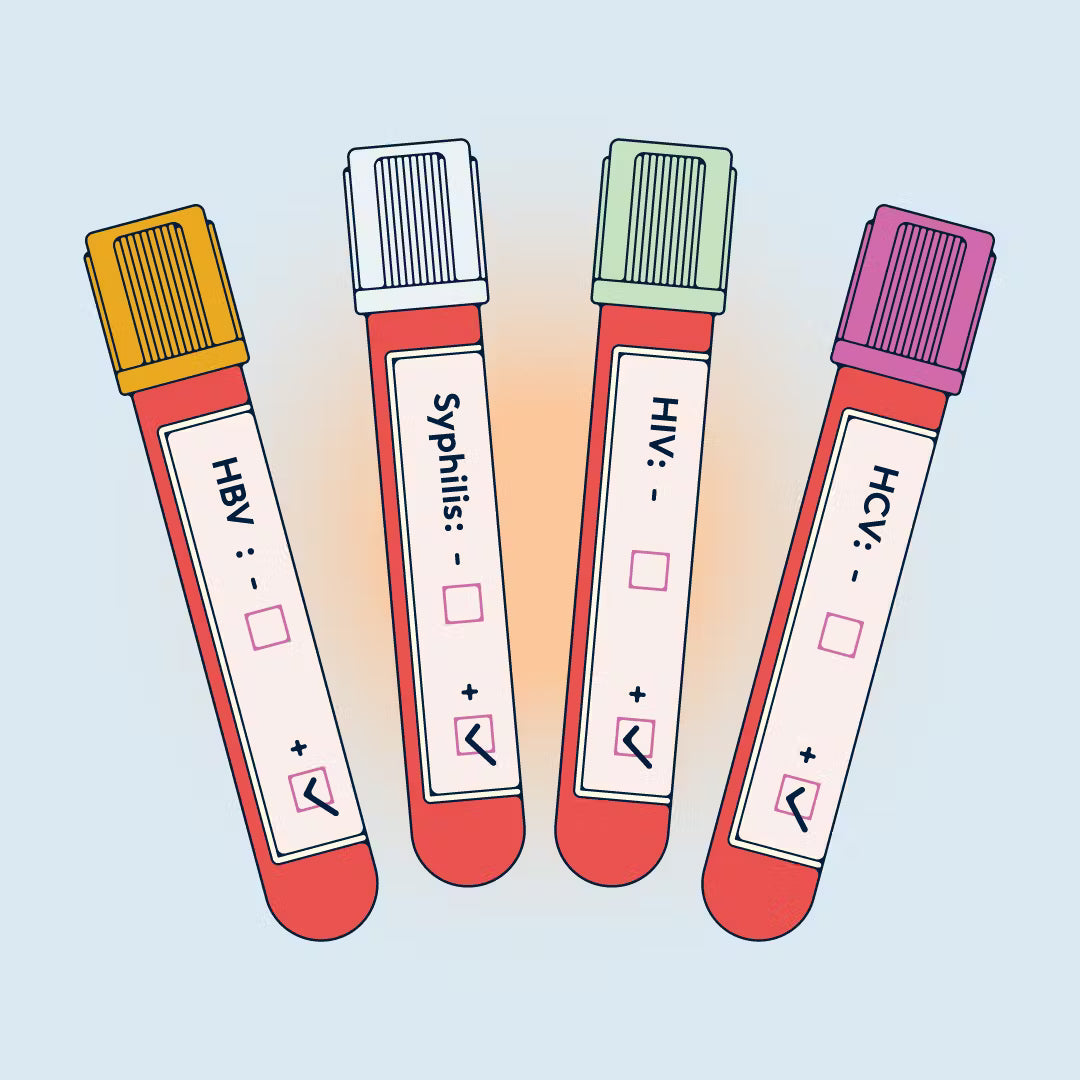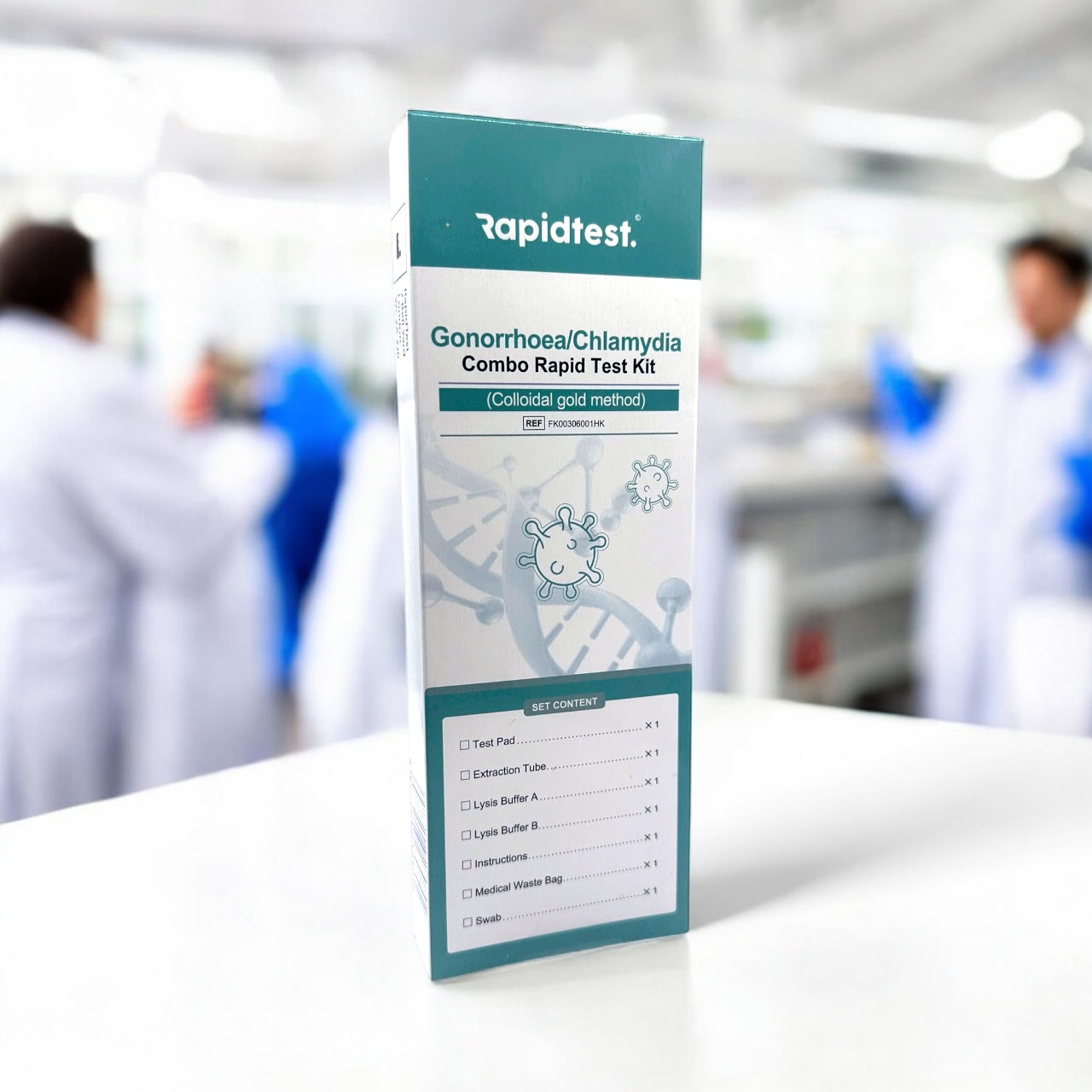
When to Test After Unprotected Sex?
Share
Understanding when to take an STI or HIV test after unprotected sex is key to getting accurate results and peace of mind.
This guide explains the best time to test, what the “window period” means, and which rapid tests you can use at home.
🧪 Overview
If you’ve had unprotected sex — whether it was spontaneous, a condom broke, or protection wasn’t used correctly — it’s completely normal to feel anxious about your sexual health.
The timing of your test matters. Every infection has a specific window period — the time between exposure and when it can be accurately detected.
Testing too soon could give you a false sense of reassurance.
Below, we’ll cover the right timeframes for HIV, Chlamydia, Gonorrhoea, Syphilis, and other common infections, plus how you can test quickly and privately at home.
What Is the Window Period?
The window period is how long it takes for your body to develop detectable markers — such as antibodies or antigens — after infection.
Testing before this time may lead to a false negative result because the infection hasn’t yet reached detectable levels.
Each STI has a different window period depending on the type of test used.
👉 Read more: How Accurate Are Rapid Tests?
When to Test for HIV
| Test Type | When to Test | Detection Method |
|---|---|---|
| HIV Rapid Test | 3–12 weeks after exposure | Detects antibodies/antigens |
| Lab-Based Test (NAT) | 10–33 days | Detects HIV RNA |
If you’ve had potential exposure to HIV, it’s best to take a rapid test after at least 3 weeks, and if negative, retest at 12 weeks for confirmation.
HIV rapid tests — like those available at RapidTest.co — offer 99% accuracy when used after the window period.
👉 Learn more: HIV Rapid Test Kit
When to Test for Chlamydia and Gonorrhoea
| Infection | When to Test | Notes |
|---|---|---|
| Chlamydia | 1–2 weeks after exposure | Can be symptomless in both men and women |
| Gonorrhoea | 1–2 weeks after exposure | Often presents earlier with discharge or burning |
If you test within the first week and get a negative result, repeat the test after two weeks to confirm.
Both infections are highly treatable when caught early.
👉 Try the Dual Chlamydia & Gonorrhoea Test Kit for fast, at-home screening.
When to Test for Syphilis
Syphilis has a longer incubation period.
| Test Type | When to Test | Why |
|---|---|---|
| Rapid Blood Test | 3–6 weeks after exposure | Detects antibodies in the blood |
If you’ve recently had a new partner, testing around the 6-week mark gives the most accurate results.
Early stages can present as painless sores or rashes, but many people don’t notice any symptoms.
👉 Learn more: Syphilis Rapid Test Guide
When to Test for Hepatitis B & C
Both Hepatitis B and C can be sexually transmitted, though risk varies.
| Infection | When to Test | Test Type |
|---|---|---|
| Hepatitis B | 4–12 weeks after exposure | Antigen/antibody blood test |
| Hepatitis C | 6–12 weeks after exposure | Antibody rapid test |
These viruses can stay silent for months, so even if you feel well, it’s important to get tested.
RapidTest.co offers simple finger-prick blood tests that provide results in minutes.
👉 Explore the Hepatitis Test Range
If You Have Symptoms
Common STI symptoms to watch for include:
- Burning sensation during urination
- Unusual discharge or odour
- Genital itching or sores
- Pelvic or testicular pain
Even mild symptoms should be checked promptly.
Read our detailed article: STI Symptoms in Men and Women →
What If You Test Too Early?
If you test before the window period:
- A negative result may be inaccurate (false negative).
- Retesting later is always recommended.
- Keep practising safe sex in the meantime.
For reassurance, many people take an initial test after 2 weeks and a follow-up test at 12 weeks to confirm.
Best At-Home STI Test Kits
You can test discreetly from home with CE-marked rapid kits that deliver results in 15 minutes or less.
Popular options include:
All RapidTest.co kits come with clear instructions, discreet packaging, and free UK delivery.
Key Takeaway
| Infection | Recommended Test Time | Test Type |
|---|---|---|
| HIV | 3–12 weeks | Antibody / Antigen |
| Chlamydia | 1–2 weeks | Antigen |
| Gonorrhoea | 1–2 weeks | Antigen |
| Syphilis | 3–6 weeks | Antibody |
| Hepatitis B | 4–12 weeks | Antibody / Antigen |
| Hepatitis C | 6–12 weeks | Antibody |
If in doubt — test now, then retest after the maximum window period for total peace of mind.
Related Guides
- HIV Rapid Test Kit →
- How to Use a Chlamydia Rapid Test at Home →
- STI Symptoms in Men and Women →
- What to Do After a Positive HIV Test →
Trust & Disclaimer
All RapidTest.co kits are CE-certified and designed for screening purposes only.
If you receive a positive or reactive result, please seek a confirmatory test through your GP or local sexual health clinic.
Summary
Testing at the right time after unprotected sex ensures accurate results and better peace of mind.
With reliable at-home kits from RapidTest.co, you can screen for STIs quickly, privately, and confidently — no clinic visit required.

